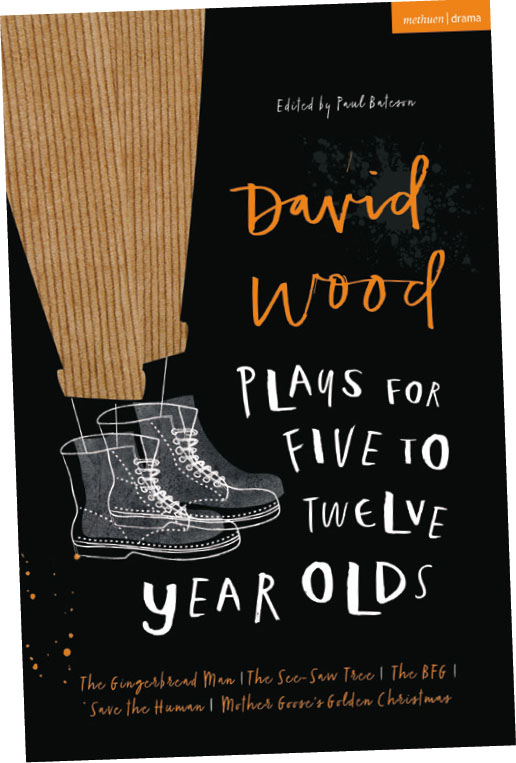David Wood: Fostering the first shoots
Nick Smurthwaite
Saturday, May 1, 2021
Passing a 50-year milestone in his career as a playwright, David Wood is renowned for introducing children to theatre with his creative stories. Nick Smurthwaite meets Wood to discuss his latest step into play production packs for primary schools

David Wood
David Wood is by far the UK's most prolific writer of plays for children. At the last count he'd notched up 75 texts – some original, and some adaptations of other people's work, including Roald Dahl, Dick King-Smith and Judith Kerr.
Now, after more than half a century of producing his plays in theatres and arts centres, Wood is offering up five of his best-known plays for production in primary schools.
Each of the five plays – The Gingerbread Man, The See-Saw Tree, The BFG, Save the Human and Mother Goose's Golden Christmas – is accompanied by extensive staging tips and lesson plans by drama teacher Paul Bateson.
Drama in education
‘To be honest’, says Wood, now in his mid-70s, ‘these plays are not all that easy to do. They normally require a lot of professional expertise. But I think teachers rather like the challenge of doing something as difficult as The BFG. Years ago, I saw a production of The Plotters of Cabbage Patch Corner performed by kids where they mimed the props and that worked brilliantly. So, you don't always have to spend a fortune on sets and props.’
Wood began his theatrical career in Theatre In Education (TIE), a subsidised company that toured primary and secondary schools throughout the country. ‘I loved it’, he recalls, ‘We used to go into the classroom afterwards and talk to the kids about the play and its message. A lot of the people involved in TIE believed that drama should be an educational tool. My answer to that was, in terms of drama, you can't educate without entertaining.’
Reinventing important issues
There is no question that Wood's plays are entertaining, and in many cases they are thought-provoking as well, especially when it comes to environmental matters. One of his earliest plays, The Selfi sh Shellfi sh, concerned the lethal effects of oil slicks on seabirds, while The See-Saw Tree – included in the new collection – is about the effects of felling an ancient oak tree on the many animals and insects that call it home.
Another play featured in the Methuen collection, Save the Human, is set in a world that has been ruined by mankind and taken over by the animals.
When produced professionally, Wood's plays usually have the benefit of elaborate sets and costumes, luxuries that few primary schools would be able to afford. The whole idea of the new collection is to encourage schools to reinvent the plays with their own resources and ingenuity, helped by the guidelines provided by Paul Bateson.

© David Wood
Fostering creativity
‘Primary teachers can be non-drama specialists, often working with limited resources, so my notes are designed to inspire and guide rather than prescribe’, says Bateson. ‘In that way teachers can adapt to their specific settings and have fun, rather than worry about re-creating a professional version.’
Rehearsing and performing plays, while not part of the curriculum, can feed into all aspects of the learning process, from design and technology to communication skills.
Bateson says, ‘It can often be the first shoots of a love of creativity, culture and theatre arts for young people to explore further in their lives. I know my love of drama was fostered in primary school.’
Adaptability
Despite their environmental and ethical merits, the plays do seem to favour a white, middle class aesthetic. ‘There is a distinct lack of multi-culturalism,’ says former Tooting primary school head Rick Brading. ‘If you're an inner-city school like mine was, you'd probably have to adapt them to meet your needs. David uses rich language, and he doesn't talk down to the kids. If I were doing, say, The BFG, I'd use the language but maybe change the context and location to somewhere the children would know and recognise.’
At his school, Brading recognised that drama was a useful learning tool, in terms of evaluating children's progress, fostering communication skills, and encouraging active learning. ‘It all comes down to the head teacher's view of learning,’ he says. ‘If they feel it helps children to understand things through drama, then they will use it as a learning tool. Some teachers prefer a more child-centred approach, getting the kids to understand a situation or a dilemma, then getting them to act it out using their own language. Whether or not schools will choose to do these plays depends on what they want the children to achieve, and if they see them as relevant and useful learning tools.’
After more than a year of enforced solitude, drama seems to offer schoolchildren the perfect antidote: teamwork, shared responsibility and an opportunity to have fun.
Paul Bateson sums it up in his introduction to the Methuen collection: ‘David understands children's theatre need not mean dumbed down or lacking in quality. The hard work, the camaraderie, the fun and the occasion of a great school show will stay with students, teachers and parents alike for a long, long time.’
David Wood: Plays for Five to 12 Year Olds is published by Methuen Drama, ISBN 9781350174924. For more information visit www.davidwood.org.uk

